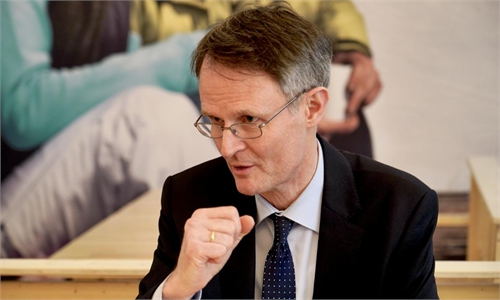Beijing Winter Olympics to boost global tourism and winter sports industries: Austrian tourism official

Emanuel Lehner-Telic, regional manager for Asia at the Austrian National Tourist Office Photo: courtesy of Emanuel Lehner-Telic
Editor's Note:
The Beijing 2022 Winter Olympics will start in five days, attracting attention of sports fans from around the world, and, at the same time, giving a fillip to tourism and winter sports industries which have been hit hard by COVID-19. In an exclusive interview with the Global Times (GT), Emanuel Lehner-Telic, regional manager for Asia at the Austrian National Tourist Office, shared his views on how the international sporting event will boost both the tourism and winter sports industries in the world, especially for winter sports countries such as Austria.
GT: Please introduce the situation of Austria's reception of Chinese winter tourists before the COVID-19 pandemic.
Emanuel Lehner-Telic: In 2019, Austria welcomed 1 million Chinese guests who spent 1.5 million overnights. Approximately 30 percent of them came during the winter season. The majority of our Chinese winter guests visited the capital Vienna and the alpine cities of Salzburg and Innsbruck. From 2010 to 2019 those figures quintupled. Also, some major ski resorts such as Arlberg, Ski Amadé and Ötztal-Sölden had a remarkable relative growth of Chinese guests. We already could experience the ongoing trend toward winter sports in China.
GT: Over 346 million Chinese people have participated in winter sports activities since Beijing's successful bid for the 2022 Winter Olympics in 2015. In your opinion, what does such a large number of winter sports participants mean for the tourism industry in countries such as Austria that are famous for winter sports?
Emanuel Lehner-Telic: China is of course a highly attractive winter sports market for both tourism and the winter sports industry. The number of Chinese people that have participated in winter sports so far is extremely impressive. For Austria, a winter sports nation, this creates an enormous opportunity to attract Chinese winter lovers and to show the positive effects of winter sports. On the other hand, this is also a cultural enrichment for the winter sports. Now there will be even more participants that can give a boost to the whole winter sports sector - both in economic and cultural dimensions.
GT: In the winter sports industry, what specific areas can China and Austria cooperate on?
Emanuel Lehner-Telic: There are so many areas where China and Austria have already established a very close cooperation. Most of the Chinese winter resorts are equipped with Austrian cable cars. Austria has also provided specialists for the development of ski resorts. The Chinese national team in alpine skiing is coached by an Austrian, same as the team of the ski jumpers. Austria is home to two largest companies that provide access systems to ski slopes. Several Austrian ski resorts have set up cooperation with Chinese ski resorts, for instance, Ski Amadé and Thaiwoo. The Chinese national team in snowboard had its training camp in Zell am See, the alpine was based in Schladming for a long time. Those are just a few examples out of the many areas our countries are cooperating in. Austria has a long tradition and experience in winter, winter sports and the winter industry and will happily continue its cooperation with China.
GT: The Beijing 2022 Winter Olympics are out of the ordinary. For example, Beijing is the world's first "Dual Olympic City" and this is the first time since the start of the pandemic that a comprehensive global sporting event is held as scheduled. So far, which of the Beijing Winter Olympics have impressed you the most?
Emanuel Lehner-Telic: I must say I was really impressed by Shougang Park. It is a pearl as a mixture of old industrial design and modern sports venues. And Beijingers will certainly be happy to use the park for leisure activities after the Olympics. I also like the venue for the ski-jumpers very much: modern architecture that fits in the landscape, it is a piece of art. And there is of course the enthusiasm of the people. One can really feel how much they are looking forward to the Olympics.
GT: What are your expectations for the Beijing Winter Olympics and the performance of Austrian athletes?
Emanuel Lehner-Telic: I think 15 medals for Austria will be a very honorable result. But the more the better of course.
GT: Many European countries are suitable for skiing, such as Switzerland. What are the advantages of Austria?
Emanuel Lehner-Telic: To put it in a nutshell, Austria is the most popular skiing destination in Europe with a market share of more than 50 percent. On the one hand, Austria offers a huge variety of ski resorts with modern infrastructure for both beginners and professionals. That means we have family resorts with easier slopes and other resort where World Cup races take place. Austria's hotels are also of high standard. There is broad range of hotels from luxury to cheaper ones. Basically, there is accommodation for any budget. In lech on Arlberg we host royal families from Europe, in Styria we have more family-oriented resorts with middle-class hotels.
Another important factor is history and culture. Austria has a very long tradition in winter sports and winter holidays. Villages and ski resorts have been growing slowly, they have been steadily improved but kept their unique characteristics, architecture, culture and habits. That's why people love the alpine panorama and the historically grown villages. Nowadays there is one more aspect: sustainability. Austria started to put emphasis on the preservation of its environment a long time ago. And for the food lovers: Have you ever tried a cheese-stuffed sausage with roast-potatoes and cabbage under the blue alpine sky?

